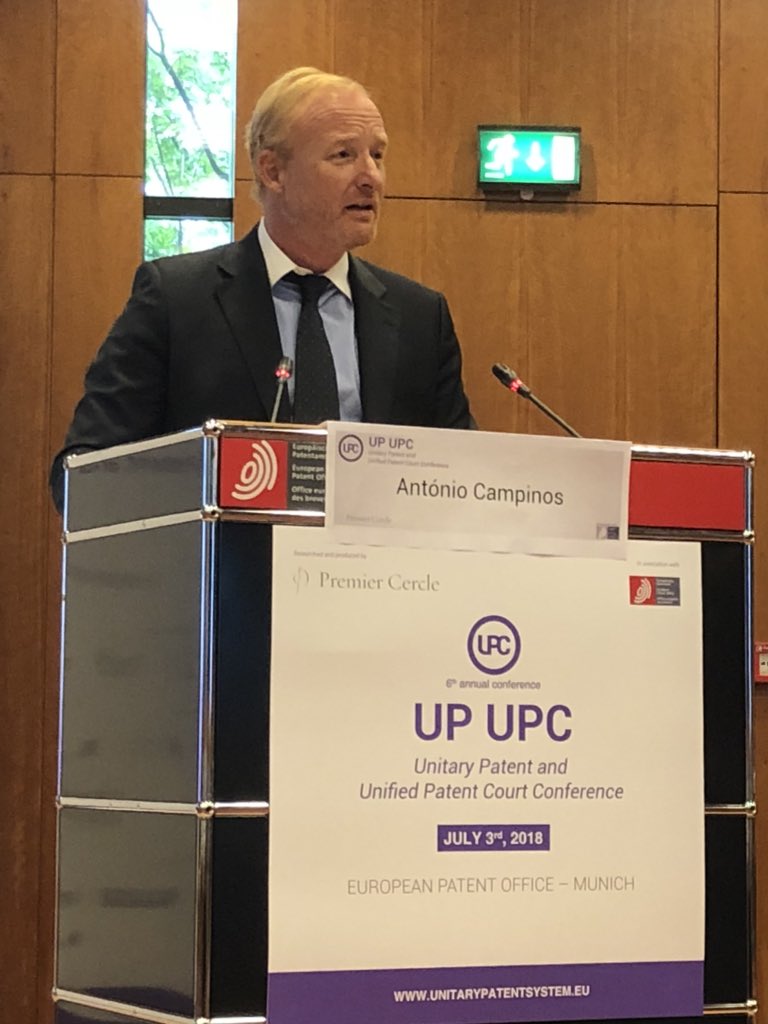
Source
Summary: The Unified Patent Court (UPC) fantasy has fizzled, but those striving to interject software patents agenda into Europe from the back door (e.g. labeling these "AI" or ignoring the stance of actual courts) aren't giving up just yet
TODAY will be mostly about USPTO matters (major things have just happened), but before we turn to that, let's look at the latest developments at the European Patent Office (EPO).
Yesterday, for the first time in a long time, the EPO did not bombard Twitter with software patents advocacy (typically 2-4 times per day, even more so lately). Even though
software patents in Europe aren't allowed "as such", today's EPO is quite blatantly ignoring even its own rules, in the name of so-called 'production' targets.
Days ago
António Campinos went to a nation that opposes the Unitary Patent, a Trojan horse for software patents in European courts (not just patent offices). One of the large nations that oppose the Unitary Patent (there are several, including Poland) is Spain and "[d]uring his official visit to Spain last week, President Campinos met with Ministers to discuss how to further strengthen the patent system and support innovation and economic growth," according to the
EPO's tweet. From the
corresponding article, which merely continues this tweet: (
warning:
epo.org link)
During his first official visit to Spain last week, EPO President António Campinos met with Ministers to discuss how to further strengthen the patent system and support innovation and economic growth. Meetings on Monday were held with the Spanish Minister of Industry, Trade and Tourism, María Reyes Maroto Illera, the Undersecretary for Industry, Trade and Tourism and President of the Spanish Patent and Trademark Office (SPTO), Fernando Valdés Verelst, and the Director General of the SPTO, José Antonio Gil Celedonio.
"Unitary Patent" or "UPC" isn't mentioned. The EPO
too seems to have come to grips with the Unitary Patent's death (Campinos
hasn't mentioned it in over two months). But Team UPC is still in denial; it is pushing UPC agenda as well as other malicious things. As
a pro-UPC site put it yesterday:
In-house and private practice lawyers discussed driverless cars, protection strategies in a digital world, compulsory licences, the UPC and FRAND at the European Patents Forum in Paris
UPC is also mentioned in
this new press release and a
tweet from Bristows, which links to Alan Johnson.
He speaks of a document that "sets out the [no 'Brexit' deal] scenarios as currently foreseen, the implications, and the actions for business and other stakeholders, concluding by recommending that businesses seek legal advice on how these arrangements could affect their business model or Intellectual Property rights."
One can interpret "recommending that businesses seek legal advice" as "go pay Bristows some money for flawed or intentionally-misleading advice on UPC."
Team UPC has no remnants of credibility by now. Every prediction it had given turned out to be false. The British
Law Gazette's Michael Cross then
published about this under the headline "Government admits 'no deal' could mean exit from patent court" (misleading headline).
No, you cannot "exit" something you never entered in the first place (and which does not even exist, either!). Quoting Cross:
New advice from Whitehall on the consequences for a 'no deal' exit from the European Union concedes for the first time that this could mean withdrawal from the embryonic 25-nation Unified Patent Court. Until now the government has insisted that the court, part of which is due to be based in Aldgate Tower, London, was not an EU institution and therefore would be unaffected by Brexit.
However a notice issued today by the Department for Business, Energy and Industrial Strategy states that the UK will have to 'explore whether it would be possible to remain within the Unified Patent Court and unitary patent systems in a ‘no deal’ scenario'.
The note also points out that there is still a possibility that the court may come into being in any case as ratification by Germany - which is subject to a court challenge - is still outstanding. 'If the Unified Patent Court is never fully ratified, the domestic legislation to bring it into force will never take effect in the UK.'
Team UPC will carry on misinterpreting government documents to spread the
infamous two lies.
Marks & Clerk (Team UPC) has long lied about software patents (to make 'sales') and this morning we saw Marks & Clerk's Stéphane Ambrosini giving misleading advice on software patents in Luxembourg because patent courts would not honour these. Here is the
relevant part:
In view of the lack of examination during the Luxembourgish application procedure, notionally all software inventions can be patented in the jurisdiction.
However, to achieve a stronger presumption of validity, embodiments of patented software inventions should exhibit a further technical effect, analogously to the legal test practised under the European Patent Convention. In practice, this means a concrete effect achieved by the software beyond the conventional physical interactions between the program and the computer on which it is run.
That still does not give it presumption of validity; European courts (not UPC) do not view software patents favourably. We have been tracking these matters for well over a decade. Going back to Team UPC's favourite platform, watch these patent zealots
promoting software patents in Europe under the guise of "AI": (
calling algorithms that)
Directors from the European Patent Office gave guidance at this year’s European Patent Forums in Munich and Paris on how inventors can successfully patent their artificial intelligence or machine learning solutions
Well, "AI" is merely a buzzword and one that the EPO habitually promotes as a cover for software patents in Europe. As for "machine learning", we'll deal with that in another post later today.
⬆
